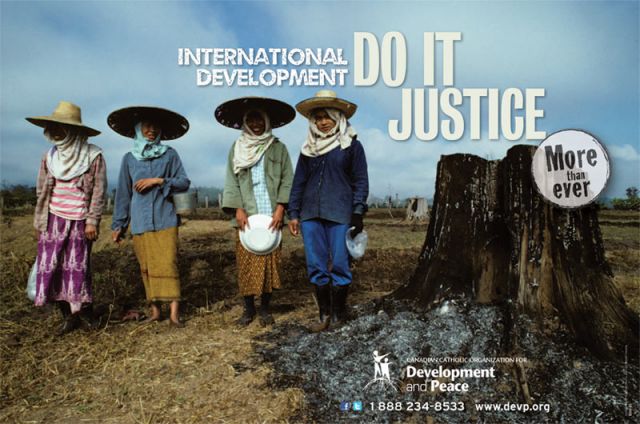News/Canada
The Canadian Catholic Organization for Development and Peace’s fall education campaign is back on, but without postcards urging Prime Minister Stephen Harper to launch a national consultation on foreign aid policy.
A limited range of fall campaign materials was posted to Development and Peace’s web site (www. devp.org) Oct. 15. The organization had planned to launch the campaign in September but ran into objections from a number of bishops, putting the traditional fall campaign on hold.
Campaign literature has been tweaked to allay bishops’
concerns that the campaign was too political, said national council president Ronald Breau. The basic program remains a critique of recent changes in Canadian foreign aid policy.
This year’s discussion of aid policy veers off-course from a five-year plan of ecological education campaigns. But the change of direction is necessary, said Breau.
“National council members were adamant that it was important to do this campaign and set the ecological campaign aside for one year,” Breau told The Catholic Register. “I would expect that we would return to the ecological campaign in the future.”
The relaunch features a four-page question-and-answer primer on Canada’s foreign aid policy, a campaign poster, a checklist for meetings with Members of Parliament, a membership brochure and an appeal for year-round monthly giving.
The most substantial document in the campaign, a discussion paper on development aid policy, was still awaiting approval from the Canadian Conference of Catholic Bishops’ standing committee on its development agency and Development and Peace’s own liaison committee for talks with the bishops’ conference.
Breau expects the discussion paper will pass final scrutiny about a week after the Oct. 15 campaign launch.
“I feel we’ve responded to the concerns that were expressed to us. We’ve taken the necessary steps and I don’t expect any delays at all,” he said.
It will be the first time in more than a decade that members won’t be asking parishioners to sign postcards or petitions. Postcards printed in August that asked Harper to establish a parliamentary committee to examine the direction of Canadian aid policy will not be sent out.
Instead of “Action Cards,” Development and Peace leadership is encouraging parish and diocesan council members to meet with their MPs to discuss aid policy.
An open, national discussion about how Canada spends its shrinking aid budget is overdue, said Nippa Banerjee, a University of Ottawa aid and development professor. Canada was the first country to deliver foreign aid through non-governmental organizations, unions, Church-based organizations and private sector groups. CIDA’s partnership branch was an innovation in the 1970s that made aid more flexible and more tightly focussed on the goals of poor people, said Banerjee. Other donor countries eventually imitated the Canadian model.
In recent years the partnership branch has been hobbled by underfunding, a bid-for-tender system that discourages long-term thinking and a decidedly more political direction, Banerjee said.
Broten sparks outrage with misogyny comments
By Evan Boudreau, The Catholic RegisterTORONTO - Comments from Ontario’s education minister that equate Catholic teaching on abortion with misogyny have provoked a letter of protest from Cardinal Thomas Collins and a call for the minister’s resignation from other irate Catholics.
Speaking to reporters on Oct. 10, Laurel Broten suggested that under the province’s new anti-bullying legislation Catholic schools should not be teaching that abortion is wrong because “Bill-13 is about tackling misogyny.”
“We’re very clear with the passage of Bill-13 that Catholic teachings cannot be taught in our schools that violate human rights and bring a lack of acceptance to participation in schools,” Broten said. She later added: “Taking away a woman’s right to choose could arguably be one of the most misogynistic actions.”
Collins sent a letter to Broten to express deep concerns about her comments. He also addressed the issue on Oct. 11 when he spoke frankly to 1,700 people attending the 33rd annual Cardinal’s Dinner in Toronto.
“It is our mission to speak up for all those who suffer, and especially those who are voiceless, for those who are forgotten,” Collins said. “We all have a stake in assuring that the faith identity of Catholic schools is respected.”
Collins did not specifically mention Broten, and neither she nor Premier Dalton McGuinty, who announced his retirement on Oct. 15, were in attendance.
The cardinal pointed to Section 93 of Canada’s Constitution and Section 1 of Ontario’s Education Act that enshrine religious freedom for denomination-al schools and “make it clear that the Catholic identity of the school must be respected.”
He said that includes the right for “all in the school community to engage in pro-life activities in order to foster a culture of life . . . Defending the voiceless is our mission.”
When the ministry was asked if Broten would respond to questions or wished to make further comment or clarify her statements, a spokesman said she was unavailable. Instead the ministry issued a statement that said Bill-13 does not change the curriculum and that the government was “confident that all schools Catholic and public, English and French will be able to operationalize the Act.”
Campaign Life Coalition has demanded Broten’s resignation. It also launched an online petition calling for the repeal of Bill-13. By The Register’s press time on Oct. 16, the petition had received more than 5,000 signatures.
“We are outraged by the McGuinty government’s frontal assault on religious liberty, and on the constitutional right of Catholic schools in Ontario to teach the Church’s pro-life views,” said Jim Hughes, national president of Campaign Life Coalition, in an Oct. 15 statement. “We have never before seen a government assault on religious freedom like what Minister Broten ispromising.” Mary Ellen Douglas, Campaign Life’s Ontario president and a former Catholic school trustee, called on all voters, “whether Catholic or not,” to protest the infringement on religious rights, what she called a “lingering threat to our most fundamental freedom.”
Marino Gazzola, president of the Ontario Catholic School Trustees’ Association, said that during the debate on Bill-13, abortion was never on the table and sees no reason why it should be there now.
“Catholic teachings are all about life. The act of abortion is contrary to the teachings of the Catholic Church and the values Catholic schools promote,” he said. “The Catholic community needs to mobilize and show that we still believe in our teachings, we still believe in the Catholic Church and that we are going to move forward like we’ve always done.”
Constitutionally speaking, Catholics are on solid ground to defend the right to teach Church doctrine in Catcholic schools, said constitutional lawyer Eugene Meehan.
“The Ontario Education Act itself enshrines denominational rights of the schools,” he said. “Section 257.52 says that the minister is not to interfere with, or control, the denomination aspects of a Roman Catholic school.”
Meehan said Broten’s comments only add fuel to a potential legal challenge of Bill-13.
“It does add additional weight because that opinion makes it clear both on the Charter and Canada’s Constitution that there are certain things that the province can do on the religious context and certainly things that they clearly can not do,” said the former legal officer of the Supreme Court of Canada. “Catholic schools and Catholic school boards being told whether they are to be pro-choice, pro-life, pro-anything doctrinally does sound awfully close to being told — in a religious context — what religious tenets can be taught and which can not.”
Defund abortion rallies focus on needed health care reform
By Deborah Gyapong, Canadian Catholic NewsOTTAWA - Pro-lifers targetted 44 Ontario MPPs Oct. 13, including Premier Dalton McGuinty, holding Defund Abortion mini-rallies outside their provincial riding offices to urge them to redirect money from abortion to real health care needs.
“It is illogical to have a health care system that is cash-starved and yet continues to allocate scarce dollars towards the killing of children,” Campaign Life Coalition lobbyist Johanne Brownrigg told 55 to 75 people outside McGuinty’s Ottawa office, which appeared to be closed, with its blinds drawn.
Delisting abortion from Ontario’s health insurance plan would save taxpayers up to $50 million, she said. That could hire more than 200 family doctors to address Ontario’s doctor shortage, 400 nurses to cut hospital wait times, treat 500 additional autistic children, buy 20 new MRI machines every year or make palliative care available in communities that lack it now, Brownrigg said.
“Let’s be clear about this elective procedure,” she said. “It is disingenuous to claim that abortion is necessary for a woman’s health.”
A 2011 Abacus poll revealed 91 per cent of respondents did not know Ontario spends $30 million to $50 million on abortion, she said.
“The more Ontarians know the figures, the less they want to see this waste on an elective procedure.”
Brownrigg said momentum is growing after MP Stephen Woodworth’s Motion 312 revealed “the ugliness of the pro-abortion position” and the unwillingness to even talk about the humanity of the unborn. Unregulated abortion and the underlying lack of humanity attributed to the unborn are spilling over into the “horrifying prospect” of infanticide being treated the same way in the courts, she warned.
Demonstrator Tom Rooney said he was incensed by Ontario Education Minister Laurel Broten’s recent remarks that the pro-abortion position could not be taught in Catholic schools.
“I resent my tax dollars going to pay for abortion because I’m a father, a grandfather and a great grandfather,” said Frank Barrett, who added there are many ways to help women with unwanted pregnancies that do not involve killing the unborn child.
Anne Dareys called the funding of abortion unjust.
“Our whole society is getting old,” she said. “We need young people to replace them to be able to support our social programs.”
Her husband Bruno said women lack information on the health and psychological impact of abortion on the mother. We only know it is a choice, but we know more about second-hand smoke than about abortion’s effects, he said.
The mini-rallies were organized by Campaign Life Coalition youth organizer Allisa Golob, who estimated 2,500 to 3,000 people took part in the cross-province mini-rallies.
“The majority of organizers were young people. However, there were others who stepped up in their communities despite their full-time jobs and taking care of their children and so on,” she said in an e-mail.
Campaign Life is organizing a larger Defund Abortion Rally for Oct. 30 at Queen’s Park, she said.
Supreme Court reserves judgment on humanity of unborn cases
By Deborah Gyapong, Canadian Catholic NewsOTTAWA - The Supreme Court of Canada has reserved judgment in two cases that involve mothers who abandoned their babies because they believed they were born dead.
On Oct. 10, the court heard the case of Ivana Levkovic who left the corpse of her baby girl on her apartment balcony wrapped in blankets inside a bag. The next day, Canada's highest court heard the case of A.D.H., who gave birth to a baby boy in a toilet at a Wal-Mart in Saskatchewan. Thinking he was dead, she fled the store and left him behind. The baby was discovered and resuscitated.
Both women were acquitted by their respective trial judges. Levkovic told the court she had fallen down, precipitating labour and the baby was born dead. Because the body was so decomposed, the coroner could not tell whether the infant girl, who was near full term, died before birth, so the judge acquitted her.
A.D.H. claimed to be surprised to discover she was pregnant and shocked by the delivery, which took place during a 14-minute visit to the store. Her case hinges on whether one's subjective belief — i.e. that the baby was dead — should override an objective standard of what a reasonable person would do under the circumstances.
Both cases touch on the contentious issue of when a child becomes a human being, since the Criminal Code has sections that seem to contradict each other. MP Stephen Woodworth's Motion 312, recently defeated in the House of Commons, sought to address the definition in Section 223.1 of the code which says the unborn child does not become a human being until the process of birth is completed.
Levkovic was charged under section 243 of the Criminal Code which makes it illegal to conceal a dead child's body whether the "child died before, during or after birth," while A.D.H. was acquitted of child abandonment.
On Oct. 10, Chief Justice Beverley McLachlan wouldn't use the word "child" since the terminology is "under contention." At one point she referred to the unborn child as the "thing" or "object" expelled from the mother's body during the process of delivery.
Attorney Jill Copeland and Delmar Doucette argued the law is too vague and creates too great a "zone of risk" for women who may not know whether they might have violated it simply by having a miscarriage. They also argued the section violates the security of the person and the rights of women to make decisions concerning a failed pregnancy as well as violates her privacy rights by forcing her to disclose that pregnancy. They wanted Levkovic's acquittal recognized.
The Criminal Lawyers' Association of Ontario intervened in the case, arguing that section 243 was criminalizing behaviour that is not a crime.
"The act of having a miscarriage is not illegal," attorney Marie Henein told the court. The right of a woman to control her own body is constitutionally protected and sacrosanct, she said, noting societal norms see these rights as settled.
Many of the questions from the bench concerned issues of viability and how likely an unborn child would be able to live outside the womb.
Arguing for the Attorney General of Ontario, Jamie Klukach argued the section has an investigatory purpose.
"The state has an interest in seeing the child and investigating" the cause of death, Klukach said.
Societal values on proper respect to the dead also apply, she said, noting that proper burial and the duty of dignity to human remains have a long common law history. So does the concept of the sanctity of life and the preservation of life. The state must be notified about deaths, she said, and a body "cannot be concealed at the whim of an individual."
Section 243 compels a woman to disclose the fact of the birth, she said. The conduct it proscribes is the intentional concealment and disposal of a body because it could involve the destruction of evidence, akin to the obstruction of justice.
Intervening on behalf of the Attorney General of Canada, Robert Frater said the law was not too vague, nor did it create too wide a zone of risk.
"A woman has to ask herself, 'If I dispose of a dead body and someone finds it might someone conclude that a crime has taken place?' ” Frater said.
Cardinal Collins defends the rights of Catholic Education
By Catholic Register Staff[Updated at 12/10/12, 10:30 a.m.]
In a rebuke to comments made by Education Minister Lauren Broten, Cardinal Thomas Collins told a packed audience that the identity of Catholic schools must be respected and the mission of Catholic schools includes engaging in pro-life activities.
Collins made his comments to 1,700 people at the annual Cardinal's Dinner on Thursday night a day after Broten suggested that under the province's new anti-bullying legislation Catholic schools should not be teaching that abortion is wrong because "Bill-13 is about tackling misogyny."
"Taking away a woman's right to choose could arguably be considered one of the most misogynistic actions that one could take," she said at a press conference. "I don't think there is a conflict between choosing Catholic education for your children and supporting a woman's right to choose."
Collins did not specifically mention Broten, and neither she nor Premier Dalton McGuinty attended the dinner at Toronto's Metro Convention Centre. The Ontario government was represented by Minister of Citizenship and Immigration Charles Sousa. He heard the cardinal defend the rights of Catholic education in no uncertain terms.
Collins said the Catholic identity of Catholic schools is "recognized and protected" by section 93 of the constitution and by section 1 of the Education Act.
"Both the constitution and the Education Act make it clear that the Catholic identity of the school must be respected," he said.
Then, referring to Bill-13, the government's anti-bullying legislation, he said:
"This is true when it comes to the establishment of anti-bullying groups designed to make the school a better place for all, and in Catholic schools that means following the method outlined in the document Respecting Difference, of the Ontario Catholic School Trustees Association. It is our mission to speak up for all those who suffer, and especially those who are voiceless, for those who are forgotten.
"It is also true when it comes to protecting the freedom of all in the school community to engage in pro-life activities in order to foster a culture of life in which the most vulnerable and voiceless among us are protected and honoured throughout their whole life on earth from the moment of conception to natural death.
"Defending the voiceless is our mission."
Collins reminded the audience that Catholic education has been an integral component of Ontario schooling since before Confederation. He said the province was blessed to have a religious and non-religious education system that "work together in co-operation to make education a treasure for which all Ontarians may truly be thankful."
"There is more beauty in the variety of a garden than in the uniform, undifferentiated, monotony of the dull flat surface of a parking lot," he said.
"The complementary variety in our educational system is an advantage for all, producing not only a healthy competition from which all benefit, but also a fruitful collaboration, and the richness of different approaches to the key issues of life.
"That diversity reflects the reality of the differences that exist in our province. The system works."
Broten, who doubles as the minister responsible for women's issues, made her comments on Oct. 10 after Campaign Life Coalition (CLC) held a press conference at Queen's Park to promote weekend rallies that will demand the province stop funding abortion through Ontario health insurance. The CLC press conference was sponsored by three Conservative MPPs.
In posing a question to Broten, a reporter said "the Catholic school system in this province is teaching the kind of intolerant thought that we saw coming out of that (CLC) press conference. They let kids out of school to go to anti-abortion rallies. Is that appropriate?" When Broten dodges that question, a reporter again asked: "Should schools be encouraging kids to go to anti-abortion rallies?"
"In Ontario, we support Catholic education, support the teaching of love and tolerance in our schools and at the same time we support the right to chose." she replied. "I am one that supports Catholic education and has been adamantly inn support of women's right to chose for many years and I do not see a conflict in those."
Catechism, at 20, maintains importance as a resource for Catholics
By Vanessa Santilli-Raimondo, The Catholic RegisterThe Catechism of the Catholic Church is the best comprehensive presentation of the Catholic faith in hundreds of years, said Vancouver Archbishop Michael Miller.
"It's the distillation of the teaching of the Second Vatican Council," said Miller.
The 20th anniversary of the promulgation of the Catechism of the Catholic Church runs parallel to the Year of Faith, which kicked off Oct. 11.
Today, the catechism is used in various settings, including RCIA programs, upper- level high school or college courses, study groups and as a personal reference tool, said Miller.
"And references are constantly made to it in books that you read on homiletics and preaching."
It's an important resource because it brings together the core teachings of the Catholic Church under three categories: the Church's doctrinal positions, Christian practices and worship, said Michael Attridge, a theology professor at Toronto's University of St. Michael's College.
But if people believe the only thing necessary to live a good, full Catholic life is to read the catechism, that is a downside, said Attridge.
"People need to study the Bible, they need to involve themselves in parish organizations, organizations that promote social justice, they need to educate themselves by going to theological school and to ask questions that relate to faith and Christian living."
Since its creation, the publications service of the Canadian Conference of Catholic Bishops (CCCB) has sold 222,787 copies of the catechism in English and French, said René Laprise, director of media relations for the CCCB. In addition, 45,673 copies of the Compendium of the Catechism of the Catholic Church have been sold through the CCCB.
"A number of copies have been sold through Canadian bookstores and direct sales from publishers in the United States and France, although we have no way of determining how many," said Laprise.
Miller added that in the archdiocese of Vancouver, there's currently a big push on YOUCAT: The Youth Catechism of the Catholic Church.
"We've distributed more than 10,000 copies of YOUCAT to parishes because it's in some ways far more accessible and user-friendly for the level of knowledge of religion that most people have."
Had it not been for the anniversary of the catechism, Miller doesn't think the arch-diocese would have come up with such an initiative. And while the catechism is the standard, he said he believes YOUCAT is more in tune to how people today learn and read.
"As much as we might lament the loss — as I do — of plunging through big books, most people today read in small bits and they're used to more pictorial representations... It's just the way things are. I think it's far more effective."
Manitoba releases Canada’s first spiritual care plan
By James Buchok, Canadian Catholic NewsWINNIPEG - Manitoba’s department of Healthy Living, Seniors and Consumer Affairs has released what it says is Canada’s first spiritual health care strategic plan.
Minister Jim Rondeau said the plan, entitled Health and the Human Spirit, “will promote opportunities for Manitobans to experience spiritual health through better awareness, understanding and healing.”
The four-year strategy was developed in sessions involving a range of community and professional stakeholders, including spiritual care providers, volunteers, counsellors, physicians, psychiatrists, policy analysts and individuals who have experienced spiritual care in a health care context. Rondeau said research has shown that higher levels of spiritual well-being, along with a sense of inner meaning and inner peace, are associated with better health outcomes, lower levels of depression and anxiety and a better quality of life.
Fr. Vince Herner, chair of the Manitoba Multifaith Council and director of spiritual care at the Misericordia Health Centre, said Manitoba “has taken an important step forward with the release of this plan. It sets out a vision and goals for Manitoba and recognizes the increasing awareness that spirituality is an important part of human wellness.”
The plan builds on the province’s previous strategies for spiritual health care, including a province-wide spiritual health care volunteer education course called the Spirit of Caring, core competencies for spiritual health care practitioners and the incorporation of traditional aboriginal healing spaces at a number of health facilities.
The new document states that there is a growing awareness that spirituality, or the way a person searches for and finds meaning, “is part of human wellness and spiritual health care must become part of health care theory and practice.”
It quotes from English authors Mark Cobb and Vanessa Robshaw’s 1998 book, The Spiritual Challenge of Health Care, which concludes, “there is what many people recognize as a spiritual quality to life, which, in suffering, confronts people with questions and possibilities that reach beyond the immediate dilemmas of physical insult.” Also in 1998, the World Health Organization endorsed a proposal to include the word “spiritual” in its description of overall health.
Health and the Human Spirit states that the connections between spiritual beliefs, practices and mental and physical health “are a growing area of research that is finding its way into practice. The discipline of spiritual health care brings together our thinking, beliefs, behaviour and culture to address the many ways human beings seek to be well in body, mind, relationships and soul.”
The authors of Health and the Human Spirit conclude that the four-year strategic plan “enables new understanding, relationships, connections and directions for health care providers to offer quality care based on leading practice.”
A copy of the spiritual healthcare strategic plan is available at the Province of Manitoba’s web site under Healthy Living.
D&P raises $1.8 million for African relief
By Catholic Register StaffMillions of Africans have food today thanks to $1.8 million Canadian Catholics have given to their development agency.
The federal government will kick in about $1.3 million in matching funds to top up five months of fundraising by the Canadian Catholic Organization for Development and Peace.
As drought struck the six-country region in May, Development and Peace saw famine on the horizon and began raising money. By August Ottawa stepped in to announce a matching funds program. A final tally of how much of Development and Peace's Sahel region fundraising is eligible for matching funds is pending, but so far the organization has identified approximately $1.3 million that Ottawa should match.
The total Development and Peace commitment in the region comes to almost $8 million, including a $5-million food distribution program the Canadian bishops' development agency is working on with Canadian Foodgrains Bank in three Sahel countries.
In Mali, Niger, Burkina Faso, Mauritania, Chad and Senegal Development and Peace is working with longstanding partner agencies and the Caritas Internationalis network on seed and food distribution, cash-for-work programs, subsidized food sales and nutrition clinics.
The federal government matching program ended Sept. 30.
COLF exhorts families to engage in new evangelization
By Deborah Gyapong, Canadian Catholic NewsOTTAWA - To mark the Synod on New Evangelization taking place in Rome Oct. 7-28 and the beginning of the Year of Faith, the Catholic Organization for Life and Family (COLF) has released a leaflet urging families to spread the Good News.
In “The Gospel of Everyday Life: an Adventure Worth Sharing,” COLF explains the role of the family as a domestic Church as well as that of lay faithful in evangelizing in light of the teachings of the Second Vatican Council and Scripture.
For decades, Catholic Church leaders have been calling for the new evangelization — “new in its ardour, new in its methods and means of expression” because “too many of the baptized live as if God does not exist,” COLF says.
“Their way of life, their opinions, their choices are aligned with an atheistic or relativistic vision of life.”
Not only baptized Catholics need to hear “Christ spoken of seriously” but so do those “with whom we rub shoulders at work, school or university, in the shopping mall, the subway or bus, in our leisure and volunteer activities."
Woven throughout with quotes from Pope John Paul II and Pope Benedict XVI, the leaflet urges people to collaborate with Christ in introducing Him to family members, friends and others.
The leaflet suggests a gentle, humble approach rather than aggressive proselytizing or imposing one’s faith on others. COLF invites Catholics to deepen their personal relationship with Jesus Christ through prayer, study of the faith and more frequent participation in the Eucharist and the sacrament of Reconciliation.
COLF focuses on Jesus the Son of God, laying out the Gospel message in a way that makes it easy to share with others. Invite Catholics who have fallen away to come back to Church, and invite others to “come and see” and be prepared for when a friend might ask, “What must I do?” to know Christ.
Evangelization is not just for priests, bishops and those in religious life, COLF insists, but is part of the call of all the baptized. It’s also the call of families as domestic churches, the leaflet says.
“God is counting on us, as parents, to make our children apostles of the new evangelization,” it says. “Whoever speaks of evangelization is obviously speaking about relationships, because we must enter into relationship with another person to be able to share with him or her the secret of our happiness.
“By nature, we are relational beings, because we are created in the image of God — Father, Son and Holy Spirit, eternally in relationship,” COLF says.
Evangelization, especially in the family, is not composed of “great speeches or theoretical lessons but through everyday love, simplicity and daily witness.”
The leaflet has a section entitled “Riddle time!” that has a question and answer format that is easy to share with children. It also includes a page with discussion questions for adults that would be appropriate for small group discussion.
The document is downloadable from Colf's web site at www.colf.ca. A workshop guide is also available.
Development and Peace, bishops continue close collaboration
By Deborah Gyapong, Canadian Catholic NewsOTTAWA - During the annual plenary of the Canadian Conference of Catholic Bishops (CCCB) in Ste. Adele, Que., Sept. 24-28, the bishops reaffirmed their ongoing collaboration with their overseas development agency, both respecting its lay-run character and ensuring its Catholic identity.
The lay-run character of the Canadian Catholic Organization for Development and Peace came under fire in recent weeks when its fall education campaign was put on hold after several bishops objected to the campaign for being too political, as first reported in The Catholic Register. The National Post and its sister papers picked up on the story Sept. 26.
The stories saying the bishops intervened, blocked or stopped the fall program are inaccurate, said CCCB president Archbishop Richard Smith in a post-plenary interview from Edmonton Oct. 1.
“The most important thing to emphasize is the bishops are working with D&P on their fall campaign,” said Smith.
The bishops support the principle of D&P’s annual fall educational campaign which raises consciousness about the needs in the developing world “to make people aware of the plight but also the reasons behind it,” he said.
D&P can embark on education programs, but when the strategy includes working through the parishes in local dioceses, “nothing should be taking place without the consent of the local bishop,” he said.
This year’s fall campaign departed from D&P’s plan of focusing on environmental themes to raising questions about Canada’s international aid policies, following substantial reductions in CIDA grants over the next five years. The agency, founded by the bishops more than 40 years ago, was “formulating a campaign as part of a broader movement of development agencies,” Smith said.
“Some of the material was becoming a little more direct political lobbying than we’re accustomed to,” Smith said. Some bishops, Smith included, expressed concern the materials might cause divisiveness in parishes and among donors.
The bishops must ensure “whatever’s done fosters the unity of the Church and is in no way divisive,” he said.
Smith said he spoke to the leadership of D&P about the concerns, which they received graciously, openly and with a “readiness to understand.”
D&P’s leadership “gave some thought to the impact on the life of the Church” of their campaign and told the bishops they would “adjust their literature to reflect their concerns.”
The bishops also heard a report from Toronto Auxiliary Bishop John Boissonneau, from the Liaison Committee composed of D&P leadership and the CCCB’s Standing Committee on Development and Peace, about the progress of documents outlining the principles guiding D&P’s relationship with its overseas partners, contracts with partners, the integration of Pope Benedict XVI’s social justice encyclical Caritas in Veritate into the agency’s work and the training of its staff.
Smith said the documents are “close to final draft stage” and “are still being reviewed.”
In other plenary news, the bishops approved next year’s budget and saw nothing unusual in the present financial pictures of the conference. There will be no hike this year in the per capita rates charged dioceses based on the numbers of Catholics living there.
The bishops also had an off-the-record meeting with Immigration Minister Jason Kenney and that went well, Smith said.
“The conversation was very respectful, open and very frank... It was a welcome opportunity to speak to the minister as a voice for the voiceless,” Smith said. “He certainly did hear us.”
The bishops also marked the upcoming 50th anniversary of the opening of the Second Vatican Council. Smith spoke of how Pope Benedict XVI in his emphasis on the Year of Faith is the clearest voice calling for people to read and understand the documents of the Second Vatican Council so the new evangelization can be based on the beauty of the Catholic faith articulated in them.
Abortion pushed on Third World may have racist agenda, says Cardinal Turkson
By Deborah Gyapong, Canadian Catholic NewsOTTAWA - Programs pushing contraception and abortion on the developing world under the guise of women's health care and "reproductive rights" may have an underlying racist agenda, Cardinal Peter Turkson said in a Sept. 28 interview.
"The program being pushed does not reflect the true situation of women in the Third World," the president of the Pontifical Council for Justice and Peace said. "It derives from a certain thinking that you deal with poverty by eliminating the poor."
Some think poverty has to do with demographics, that because populations are so high they cannot feed themselves so stopping population growth is the key to ending poverty, Turkson said.
"I can think of nothing more fallacious than that," said Turkson, who was in Ottawa for a conference at Saint Paul University on the Second Vatican Council.
"Since when did abortion become a health issue?" he asked, though he noted some argue that without proper access women will "seek it through the back door."
If people are serious about women's health care there are many more things needed than abortion and contraception, he said.
"Why not ask the Africans what they need? Why not ask the Asians what they need for women's health?" he said.
"It's not for people sitting here (in the West) to decide the issues for people in developing world are abortion and contraception. These are not health issues."
The cardinal said he has met people from various ministries in Europe who "think this is the thing to do."
"There will be a racist agenda behind all of this," he said, noting the population control efforts are focused on Africa and Asia.
He used his own life growing up in Ghana as an example of why population control is not the answer to reducing poverty. Neither his father nor mother ever went to school. His father worked as a carpenter; his mother traded vegetables in the market.
"You can think of the income of such a family and yet they took care of 10 of us," he said.
All his siblings completed secondary school; one brother got into the technology field and works in Toronto; another worked for the United Nations in Denmark.
"What it requires is good will on the part of the parents and sacrifice," he said. "It doesn't require sterilization or abortion."
He noted some children of poor families "invariably grow up to pull others out of poverty."
Turkson stressed the Church's social doctrine cannot be separated from concern for unborn life and warned against Catholic development agencies getting involved in the push for abortion or contraception through the guise of improving women's lives in the development world.
When it comes to Catholic groups working under the Caritas Internationalis federation, "we cannot have a group that is Church-based which is at variance with Church teaching," he said.
"We have to move from this schizoid experience of believing one thing and doing another. Our faith should inspire what we do."
People donate to Caritas groups because they see images of famished people or children who need an education, he said. If for any reason agencies collect money that goes to another purpose or ends up some other place that violates the principle of following the giver's intention.
Turkson stressed the inseparability of spreading the Gospel from justice and peace, as well as the inseparability of respect for unborn life from the Church's social doctrine.











